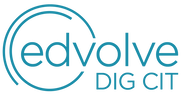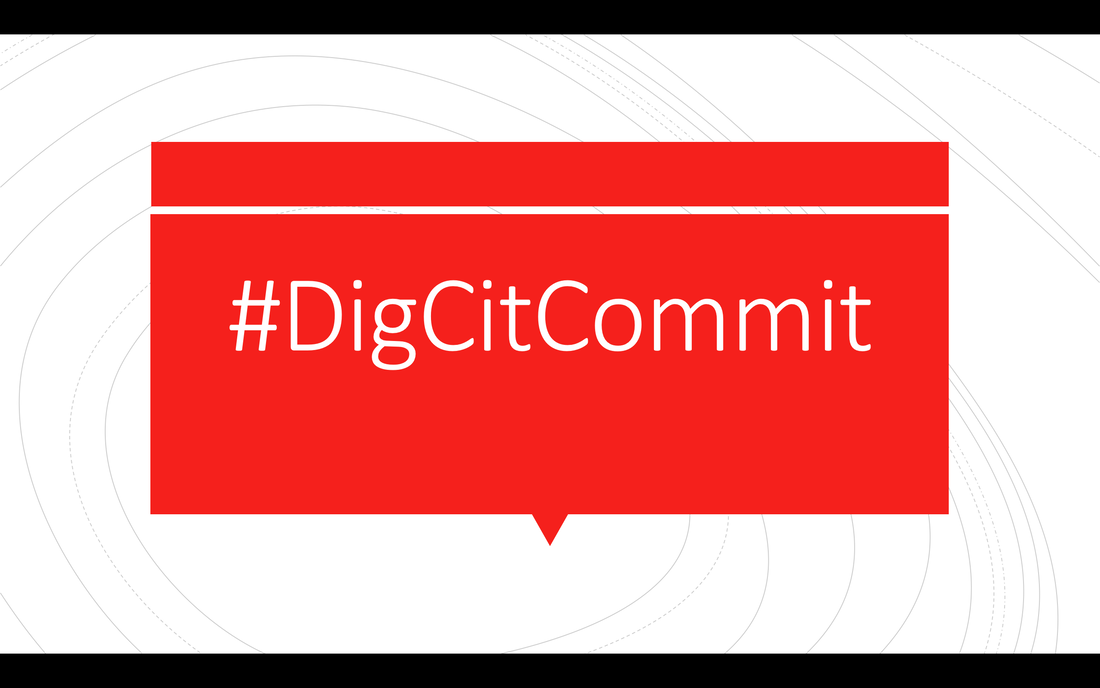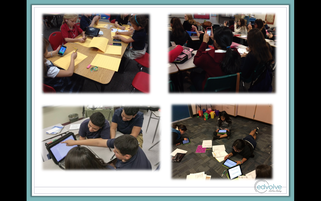|
Listen, they were all educators with demanding and exhausting "day jobs" and I genuinely wanted to know why they got up early on a Saturday morning to attend a professional learning opportunity focused on digital citizenship. I wanted to know their "why." Then I told them mine. In 2011, I worked at Arizona State University (Mary Lou Fulton Teachers College). My role there was to transition the program to an "infusion" model, whereby technology (i.e., ISTE Standards) would be integrated into the methods coursework for all pre-service teachers. Without going into too much detail and bird walking into another conversation, suffice it to say that the transition to the infusion model inadvertently left digital citizenship in the dust (read: it was NOT being taught in any of the education courses.) So, while more and more K-12 classrooms were looking like the photos below with K-12 students using technology as important learning tools, we were not preparing teachers to promote responsible and ethical technology use within their instructional practice. #YIKES!! me that they "needed" to hire teachers that understood how to effectively use technology for instruction AND who understood digital citizenship. Additionally, more and more of my non-educator friends began to talk about it. They didn't use the term "digital citizenship," but they were undoubtedly talking about responsible and ethical use of technology. You see, they were "hearing things"... the media was full of stories about teens that had lost scholarships or college admittance because of something they posted on social media, the prevalence of sexting, and cyberbullying that led to tragic results. My friends were asking me what to do, how to keep their kids safe from harm, and how they would know if their kids were involved in any of these things they had read about or seen on the news. Those conversations were driven by fear, but they opened a very important door to begin a different, more positive conversation about technology use and digital citizenship. Digital citizenship was more important and relevant than ever before. That's when I made a commitment to the pre-service teachers at ASU and the faculty with whom I worked. I would NOT continue to promote more and more student technology use in the classroom until I paired that with digital citizenship. The conversations MUST go hand in hand, period. 2012 #digcitcommit My commitment became an "all in" kind of thing for me. I began studying, researching, and discussing digital citizenship with a whole lot of people (both education folks and non-education folks). I authored a series of digital citizenship modules for all teacher candidates in the college. I even conducted my own study and wrote a dissertation focused on increasing pre-service teachers' intention to "model and promote digital citizenship" in their future classrooms. More recently... In his 2018 keynote presentation, ISTE CEO, Richard Culatta threw out a challenge to all educators - "Commit to doing just one thing to promote digital citizenship in the coming school year and share pledges on social media using the hashtag #digcitcommit." Since making my 2012 commitment, I've learned a lot about digital citizenship, both in theory and in practice; I've seen an "evolution" in the digital citizenship conversation (<< that's a whole other blog post that I haven't written... yet); and, I've developed a strong perspective on how educators & parents should work with youth to inspire them to lead a digital life consistent with who they authentically are. Today, my commitment is even wider, deeper, and broader than it was back then. As our digital lives continue to transform, I am more dedicated than ever to elevating the conversation about what it means to be a citizen in the increasingly digital world we live in, and helping educators to do the same, in partnership with students & families. I aspire to include student voice in this conversation, and I am committed to sharing what I learn with others. This is my #digcitcommit. What is yours? Did you know that Digital Citizenship Week is Oct. 15-18? Just in time to think about how you will take one step forward in your digcit practice this school year! If you're short on ideas, maybe one of the following suggestions will resonate:
Digital citizenship is an enormous topic that is constantly evolving, which is why this ongoing conversation is so important. #DigCitCommit ISN'T about mastering it all at once or turning into a digital citizenship guru... you don't need to conduct extensive research on digital identity or write a thesis on social media use to have an impact on your students' digital lives. #DigCitCommit IS about taking one step forward. JUST. ONE. STEP. If we all take one step, think about the collective impact we have on students. I'm in. Are you? #digcitcommit Cheers, LeeAnn P.S. Would love to hear from you - please feel free to comment and share your #digcitcommit for promoting digital citizenship this school year!
1 Comment
|
AuthorI care deeply about helping educators cultivate healthy environments where every student and teacher can learn, grow, and thrive in this digital world! |




 RSS Feed
RSS Feed
